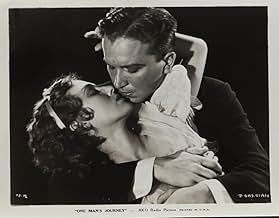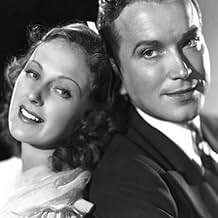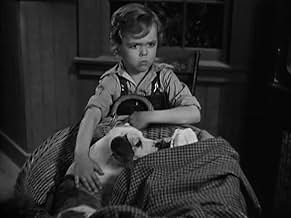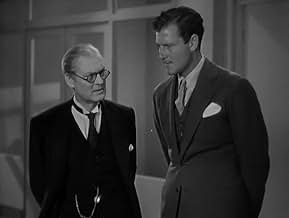Füge eine Handlung in deiner Sprache hinzuWidower Dr. Watt moves to a small town, raising son Jimmy and abandoned Letty. Despite aspirations for research, epidemic, family needs hinder his goals. Years later, he realizes his life wa... Alles lesenWidower Dr. Watt moves to a small town, raising son Jimmy and abandoned Letty. Despite aspirations for research, epidemic, family needs hinder his goals. Years later, he realizes his life wasn't a failure.Widower Dr. Watt moves to a small town, raising son Jimmy and abandoned Letty. Despite aspirations for research, epidemic, family needs hinder his goals. Years later, he realizes his life wasn't a failure.
- Auszeichnungen
- 3 wins total
Samuel S. Hinds
- Dr. Babcock
- (as Sam Hinds)
Frank Ball
- Townsman
- (Nicht genannt)
Dorothy Gray
- Letty's Daughter
- (Nicht genannt)
John Ince
- Dr. James Carson
- (Nicht genannt)
Lloyd Ingraham
- Townsman at Farewell Meeting
- (Nicht genannt)
Dave O'Brien
- Dance Extra
- (Nicht genannt)
Empfohlene Bewertungen
It's strange to see the similarities in this film and "It's A Wonderful Life" from 13 years later. Barrymore plays a country doctor, Eli Watt, who has failed at a bigger practice, has become a widower, and now returns to his small town along with his small son to set up practice on his on. His first case has a horrible outcome, although it is not the doctor's fault. A farmer's wife dies in childbirth and the farmer (David Landau) does not want the baby girl and says he will get the poor farm to come and get her. Dr. Watt takes the baby girl in as his own and raises her as his daughter, Letty. In one plot turn I could not figure out, Mae Robson appears out of nowhere and says her life is empty and figures it can be fuller by keeping house for the doctor and his family.
The film is rather melodramatic, but the great acting of Barrymore and company make it worth your while, as the good doctor gets paid rarely in money and more often in potatoes, handles epidemics, and his son Bill grows up to be...Joel McCrea! (Bill Watt as a young man). Eli has always dreamed of specializing and even traveling to Europe to study with some of the great doctors, so he can bring what he has learned back to his community. However, time after time some emergency, Bill's tuition for medical school, plus just the plain old passage of time delays that dream until finally, old age finds Eli Watt, and he resigns himself to his fate, although with contentment rather than the anger and bitterness of George Bailey.
Will anyone ever notice his sacrifice and all he has done for the town? Watch and find out. It's a sentimental journey, but worth watching.
Other odd coincidences between this film and It's A Wonderful Life - one of the characters that Dr. Watt crosses paths and locks horns with over the years is a rich banker who thinks money can fix everything and therefore everybody wants his money - much like Barrymore's character in IAWL. Also, one imminent physician who respects country doctor Eli Watt and his accomplishments and sacrifice is played by Samuel S. Hinds, who played Pa Bailey in IAWL.
One thing that came out of nowhere for me and seemed a bit silly too, and doesn't have anything to do with the plot, so I will talk about it. When Dr. Watt first shows up and Sarah (May Robson) becomes the Watt housekeeper, she looks about 20 years older than Dr. Watt - and May Robson was in fact 20 years older than Lionel Barrymore. At the end of the film Dr. Watt has aged twenty years, and Sarah looks the same, to the point that she proposes marriage and he gives one of the most unromantic acceptances in the history of the world.
Films did give quite a few age un-appropriate roles to May Robson - she was 75 when this movie was made. I guess her great energy just makes you forget her age most of the time.
The film is rather melodramatic, but the great acting of Barrymore and company make it worth your while, as the good doctor gets paid rarely in money and more often in potatoes, handles epidemics, and his son Bill grows up to be...Joel McCrea! (Bill Watt as a young man). Eli has always dreamed of specializing and even traveling to Europe to study with some of the great doctors, so he can bring what he has learned back to his community. However, time after time some emergency, Bill's tuition for medical school, plus just the plain old passage of time delays that dream until finally, old age finds Eli Watt, and he resigns himself to his fate, although with contentment rather than the anger and bitterness of George Bailey.
Will anyone ever notice his sacrifice and all he has done for the town? Watch and find out. It's a sentimental journey, but worth watching.
Other odd coincidences between this film and It's A Wonderful Life - one of the characters that Dr. Watt crosses paths and locks horns with over the years is a rich banker who thinks money can fix everything and therefore everybody wants his money - much like Barrymore's character in IAWL. Also, one imminent physician who respects country doctor Eli Watt and his accomplishments and sacrifice is played by Samuel S. Hinds, who played Pa Bailey in IAWL.
One thing that came out of nowhere for me and seemed a bit silly too, and doesn't have anything to do with the plot, so I will talk about it. When Dr. Watt first shows up and Sarah (May Robson) becomes the Watt housekeeper, she looks about 20 years older than Dr. Watt - and May Robson was in fact 20 years older than Lionel Barrymore. At the end of the film Dr. Watt has aged twenty years, and Sarah looks the same, to the point that she proposes marriage and he gives one of the most unromantic acceptances in the history of the world.
Films did give quite a few age un-appropriate roles to May Robson - she was 75 when this movie was made. I guess her great energy just makes you forget her age most of the time.
This is one of the "lost but found" films shown on TCM on 4/4/07. Apparently this and two other films shown that night were held out of public release due to litigation concerning royalties and now the powers that be at Turner Classic Movies have taken care of the licensing issues. Of the three films shown that night, none of them were great treasures but all three were excellent--very solid examples of the type of films RKO made during the era. Normally, when you think of RKO in 1933, you think KING KONG or Astaire and Rogers as a team, but there were other good films that might rank just below them in quality and entertainment.
This film is rather reminiscent of several other doctor dramas from the era (such as THE CITADEL and ARROWSMITH) where the doctor's nobility and sacrifice are celebrated. A younger Lionel Barrymore (sporting a dark doo thanks to hair dye) comes to a rural area to set up a medical practice. However, at first, he is unsuccessful and only begins to get patients when he agrees to use the barter system. Because of this, he is constantly in financial straits, but because he is so noble and decent, he doesn't give up and is eventually accepted and loved by the community. While all this could have been VERY syrupy, thanks to good writing and a terrific performance by Barrymore it is not.
There is certainly a lot more to the movie than this--including an excellent (as usual) performance by May Robson and an early performance by Joel McCrea. See this film and see a "small" film that really packs an excellent punch.
This film is rather reminiscent of several other doctor dramas from the era (such as THE CITADEL and ARROWSMITH) where the doctor's nobility and sacrifice are celebrated. A younger Lionel Barrymore (sporting a dark doo thanks to hair dye) comes to a rural area to set up a medical practice. However, at first, he is unsuccessful and only begins to get patients when he agrees to use the barter system. Because of this, he is constantly in financial straits, but because he is so noble and decent, he doesn't give up and is eventually accepted and loved by the community. While all this could have been VERY syrupy, thanks to good writing and a terrific performance by Barrymore it is not.
There is certainly a lot more to the movie than this--including an excellent (as usual) performance by May Robson and an early performance by Joel McCrea. See this film and see a "small" film that really packs an excellent punch.
Lionel Barrymore gave a memorably restrained performance in this 1933 film. It stands as a precursor to films such as 1959's "The Last Angry Man" with Paul Muni.
The setting takes place in rural America circa 1910. Having lost his wife in childbirth, Barrymore returns to his roots only to lose his first patient there as well to child-birth. The embittered husband is ready to take the baby to the poor house but Barrymore takes the little baby girl in along with his young son. Just on the girl's 4th birthday, the father returns and seems much reformed. Barrymore gives the girl, Letty, back to him. Letty maintains a father-like relationship with Barrymore through the years.
As the years pass, Barrymore wins the hearts of the town with his dedication and free services for the impoverished.
He lets opportunities pass which could have gotten him out of the town. Some how we know this from the George Bailey effect of 1946's "It's A Wonderful Life." Like George Bailey, this doctor is going nowhere.
May Robson costars as a beloved housekeeper who enters the Barrymore home at precisely the right time.
This is a nicely done heartwarming story of rural America from 1910 through 1933.
The setting takes place in rural America circa 1910. Having lost his wife in childbirth, Barrymore returns to his roots only to lose his first patient there as well to child-birth. The embittered husband is ready to take the baby to the poor house but Barrymore takes the little baby girl in along with his young son. Just on the girl's 4th birthday, the father returns and seems much reformed. Barrymore gives the girl, Letty, back to him. Letty maintains a father-like relationship with Barrymore through the years.
As the years pass, Barrymore wins the hearts of the town with his dedication and free services for the impoverished.
He lets opportunities pass which could have gotten him out of the town. Some how we know this from the George Bailey effect of 1946's "It's A Wonderful Life." Like George Bailey, this doctor is going nowhere.
May Robson costars as a beloved housekeeper who enters the Barrymore home at precisely the right time.
This is a nicely done heartwarming story of rural America from 1910 through 1933.
Lovely movie from an earlier time. Incredibly well-acted by most concerned. Except for McCrea, who, it seems to me, is as stiff as a board. While I realize he was supposed to exude a sort of heartless diffidence, I don't think that's the problem; I just don't think he had really come into his own yet. Of course he was a tall, handsome guy with a good voice and, with time, he became a solid actor -- but it's interesting to see him upstaged by almost everyone in this early entry.
And while the film can feel "dated," what is one to expect from a bit of art that was made so long ago? Perhaps that sense of "datedness" comes from the fact that today we are just so "aware" and cynical. Personally, I like the tone of the film....
And while the film can feel "dated," what is one to expect from a bit of art that was made so long ago? Perhaps that sense of "datedness" comes from the fact that today we are just so "aware" and cynical. Personally, I like the tone of the film....
One Man's Journey is the sentimental filmed tale of the life of a country doctor as played by Lionel Barrymore. It's a nice, but very dated story, doctors like Barrymore are sadly a thing of the past.
Barrymore arrives back in his hometown, a widower with a small son who later grows up to be Joel McCrea and follows in his father's footsteps as a physician. In fact he starts off on the wrong foot by losing the mother during a difficult pregnancy. The daughter from that pregnancy grows up to be Dorothy Jordan and she's more Barrymore's child than she is of David Landau.
May Robson's in this film also as Barrymore's feisty housekeeper who brings an aged feminine touch to his household as well as a streak of practicality. She's probably the best one in the film.
One Man's Journey bears a lot of resemblance to Goodbye Mr. Chips. Like Chips the schoolmaster in Great Britain, Barrymore's Doctor Eli Watt affects literally hundreds of lives during the course of his time on earth. Like his son Joel McCrea said in a much later picture, Eli Watt enters his house justified.
It's a nice film, terribly dated though and that's not a good thing.
Barrymore arrives back in his hometown, a widower with a small son who later grows up to be Joel McCrea and follows in his father's footsteps as a physician. In fact he starts off on the wrong foot by losing the mother during a difficult pregnancy. The daughter from that pregnancy grows up to be Dorothy Jordan and she's more Barrymore's child than she is of David Landau.
May Robson's in this film also as Barrymore's feisty housekeeper who brings an aged feminine touch to his household as well as a streak of practicality. She's probably the best one in the film.
One Man's Journey bears a lot of resemblance to Goodbye Mr. Chips. Like Chips the schoolmaster in Great Britain, Barrymore's Doctor Eli Watt affects literally hundreds of lives during the course of his time on earth. Like his son Joel McCrea said in a much later picture, Eli Watt enters his house justified.
It's a nice film, terribly dated though and that's not a good thing.
Wusstest du schon
- WissenswertesMerian C. Cooper had accused RKO of not paying him all the money contractually due for six RKO films he produced in the 1930s. In 1946, a settlement was reached, giving Cooper complete ownership of the RKO titles: Rafter Romance (1933) with Ginger Rogers, Double Harness (1933) with Ann Harding and William Powell, The Right to Romance (1933) with Ann Harding and Robert Young, One Man's Journey (1933) with Lionel Barrymore, Living on Love (1937) and A Man to Remember (1938).
In 2006, Turner Classic Movies, which had acquired the rights to the six films after extensive legal negotiations, broadcast them on TCM in April 2007, their first full public exhibition in over 70 years. TCM, in association with the Library of Congress and the Brigham Young University Motion Picture Archive, had searched many film archives throughout the world to find copies of the films in order to create new 35mm prints.
- PatzerAs Dr. Watt leaves the McGinnis house, the shadows of the trees fall clearly on the "sky" cyclorama.
- VerbindungenFeatured in TCM: Twenty Classic Moments (2014)
- SoundtracksDown By the Old Mill Stream
(1910) (uncredited)
Written by Tell Taylor
In the score during the opening credits and at the end
Top-Auswahl
Melde dich zum Bewerten an und greife auf die Watchlist für personalisierte Empfehlungen zu.
Details
- Erscheinungsdatum
- Herkunftsland
- Sprache
- Auch bekannt als
- El viajero solitario
- Drehorte
- Produktionsfirma
- Weitere beteiligte Unternehmen bei IMDbPro anzeigen
- Laufzeit
- 1 Std. 12 Min.(72 min)
- Farbe
- Seitenverhältnis
- 1.37 : 1
Zu dieser Seite beitragen
Bearbeitung vorschlagen oder fehlenden Inhalt hinzufügen




























